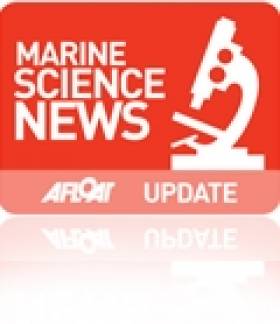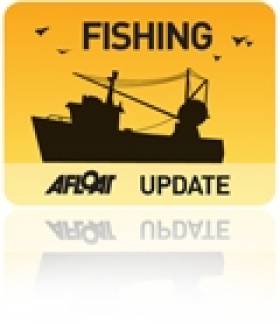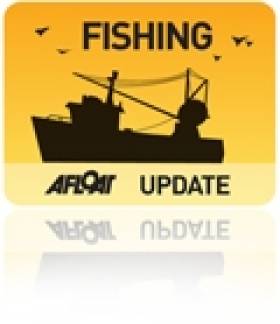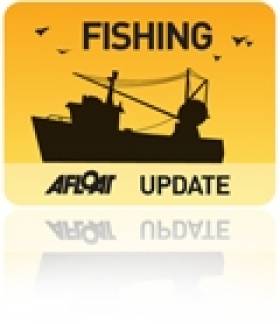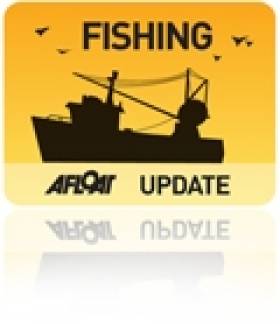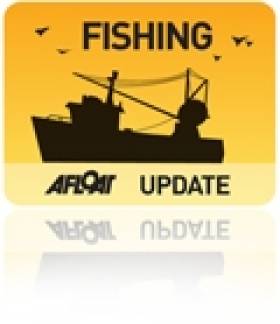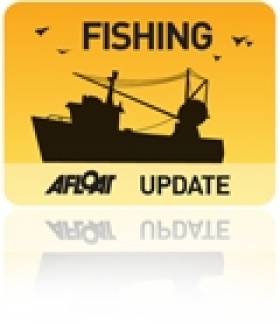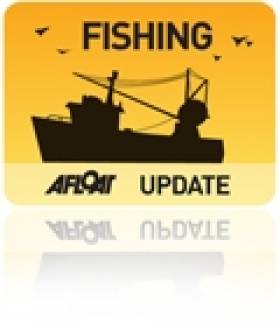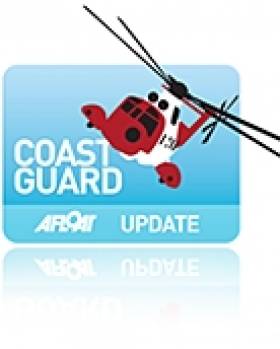Displaying items by tag: Fishing
#MarineScience - Two marine scientists associated with the Marine Institute through research carried out under the Sea Change Strategy have gone on to win support for specific small projects through the newly established International Council of the Exploration of the Sea (ICES) Science Fund.
Earlier this month ICES announced eight projects to be supported through the new Science Fund and focused on those that will add value to the ICES Science Plan of achieving integrated marine ecosystem understanding.
Dr Peter Heffernan of the Marine Institute congratulated Dr Sarah Kraak and Dr Kathryn Hughes on their projects being selected, saying: “It is a great achievement for the two researchers associated with the Marine Institute to be awarded the ICES funding.
"By encouraging researchers to engage with both academic and government institutions, this allows us to provide the best available science and knowledge and to make informed decisions of our ocean wealth at a national and international level.”
Dr Sarah Kraak from University College Cork is currently a postdoctoral fellow working on research to develop and test through simulation a suite of measures that will contribute to rebuilding depleted fish stocks in waters around Ireland carried out under the Sea Change Strategy and funded by the Marine Institute.
As lead scientist, Dr Kraak’s ICES project is called 'Insights from Behavioural Economics to improve Fisheries Management', and is co-lead by Ciaran Kelly from the Fisheries Ecosystem Advisory Services at the Marine Institute.
“Conventionally, fisheries management aims to modify the behaviour of fishers with laws and regulations," said Dr Kraak. "This method of a top-down control may not always fully achieve its objectives, owing to the interests of the individual fishermen.
"Therefore, using the discipline of Behavioural Economics, the project aims to research what drives human behaviour in fisheries. This approach may prove to be more useful in fisheries management and achieving sustainable resource exploitation."
In addition to the ICES funding, this project has already attracted a small grant from the Fisheries Society of the British Isles (FSBI).
The other project is a postdoctorate project led by Dr Kathryn Hughes from Bangor Universtiy in the UK. Dr Hughes recently completed her PhD on the impact of climate change on the distribution, biology and productivity of fish stocks in waters around Ireland, which was funded by the Marine Institute under Sea Change and co-supervised by Leonie Dransfeld from the Marine Institute.
Following completion of her PhD, Dr Hughes is now working on an international project called 'Developing Methods for Determining a Global Footprint of Mobile Bottom Fishing Using VMS Data', which aims to highlight the effects of trawling from countries that do not have the required resources to process and analyse raw fishing effort data.
ICES co-ordinates and promotes marine research in the North Atlantic Ocean, the North Sea, and the Baltic Sea, and advises international commissions and governments on marine policy and management issues related to the impacts of human activities on marine ecosystems and the management of the exploitation of living marine resources. ICES is working towards integrated ecosystem assessments and integrated advice, delivered at the regional seas level.
ICES is a network of more than 4,000 scientists from almost 300 institutes, with 1,600 scientists participating in activities annually from 20 member countries. To view the full list of projects and to follow their development, visit the ICES website HERE.
Empowering Coastal Communities Conference
#FLAGseminar – Empowering Local Communities is a two-day conference next week (April 30-1 May) which is to be held in the Haven Hotel, Dunmore East, Co. Waterford.
The focus of the conference is a working seminar for coastal communities in which The Waterford Estuary Communities Network (WECN) is hosting the event as part of the EU FLAG (Fishing Areas Local Action Group) initiative.
Empowering Coastal Communities is to identify pathways to effective development actions in coastal communities. Opening remarks will be presented by Sean Kelly MEP.
All FLAG groups will be represented from the Island of Ireland, Maritime and fishing agencies and organisations, local authorities especially in coastal counties, community and development bodies.
For further details including download programme, conference tickets visit this LINK.
#fishing – Sea breezes promise to freshen up proceedings at the annual open-to-all conference of the Institute of Fisheries Management (IFM) in Liverpool, October 7-9. Marine fisheries will feature in about half the sessions.
"Managers properly trained and skilled for a future in fisheries are the best hope for preserving the sea and freshwater fish we have left so that they will provide food and recreation in perpetuity," said Keith Hendry, chairman of the organising committee.
"Sound science-based management is the key to sustainable and productive fisheries," said Dr. Hendry who is also managing director of APEM the UK-based international environmental consultancy.
The conference, entitled "Fisheries Management from Sea to Source" will open with a session on the ecological significance of sea-run and estuarine fish, followed by papers on managing transitional fisheries and catchment management.
The second day will move on to marine development and fisheries management, estuary habitat restoration and the ever topical and controversial subject of barriers in rivers and the need for fish passes to ensure spawning and migratory species swim into the upper reaches of rivers.
Proposals for presentations to the conference should be made to the administrator at [email protected] and registrations to attend can be made on the institute's website www.ifm.org.uk from June onwards.
Fishermen At Greatest Risk Of Death On The Job Says HSA
#Fishing - Fishermen in Ireland have a risk of on-the-job fatality that's 40 times greater than average, as The Irish Times reports.
The shocking statistic comes with new figures from the Health and Safety Authority (HSA), which is launching a new campaign to reduce the rates of death and serious injury in the fishing sector.
This campaign will concentrate on the proper management of heath and safety before leaving port as well as safety at sea, by encouraging fishing boat skippers to carry out proper risk assessments and prepare safety statements.
Current figures show only 20% of vessels inspected last November by the HSA has completed a risk assessment, while just 30% had a safety statement.
HSA chief Martin O'Halloran said: "It’s vital that skippers and fishermen manage the very serious risks they’re facing and work to ensure that tragedy doesn’t strike their boat.” More on the story HERE.
Meanwhile, The Irish Times is also reporting on the loss of as many as 230,000 farmed fish off West Cork in one of the series of Atlantic storms that battered Ireland's coasts in the first few weeks of this year.
A site survey at an aquaculture facility run by Murphy's Irish Food in Bantry Bay found that storm damage to its mooring system and several of its cages caused the death of most of its farmed salmon.
But local anti-fish-farming campaigners Save Bantry Bay say that the damage also resulted in the "largest single salmon farm escape" in Irish history, posing a "significant genetic risk" to native wild stock.
The Irish Times has more on this story HERE.
Lengthy Mackerel Negotiations Lead to Agreement Between EU, Norway & the Faroe Islands
#mackerel – Following years of disagreement and often bitter dispute between the countries fishing on the annual €1billion Mackerel stock in the North East Atlantic, a three party five year agreement involving the EU, Norway and the Faroe Islands has been reached today in London. This agreement addresses the management of Mackerel by the three parties in the North East Atlantic. This Agreement was only reached after particularly intensive negotiations over the last eight weeks. Iceland is not party to this agreement.
Minister for Agriculture, Food and the Marine, Simon Coveney TD today said "I have always supported a deal that would bring an end to the irresponsible and excessive fishing of mackerel stocks that we have seen over the past five years. This new five year agreement, which is certainly not ideal, does ensure that in line with the EU and Norway, the Faroese will be subject to fixed quotas which will protect against the previous dangerously high levels of fishing and help to secure the long term sustainability of this stock, which is of vital importance to Ireland." .
The Minister also said "I welcome the fact that under this Agreement Iceland will get no access to EU Waters to fish Mackerel and this was always an important principle for myself and for the Irish Fishing industry to secure as part of any agreement in order to protect the markets for Irish fishermen. I also welcome the fact that Norway got no additional access to fish Mackerel in EU waters. In addition, I welcome the fact that the Quota of Mackerel available to Irish Fishermen to fish this year on foot of this agreement will increase by over 60% from the current 65,000 tonnes to 105,000 tonnes." Mackerel is Ireland most valuable fishery.
Minister Coveney added that "While clearly disagreeing with aspects of the deal, I always recognised the importance of bringing the Faroes Islands into an agreed and responsible management arrangement of the mackerel stock with the EU and Norway. However, I was disappointed with an aspect of the final outcome which gave the Faroe Islands an increased 12.6% share of the stock and set aside a further 15.6% for Iceland, Greenland and Russia. I consistently argued at Council and throughout these negotiations that the levels being proposed for these parties were too high and on that basis I could not support the overall deal. The European Commission and the other EU Mackerel Member States were willing to accept the granting of those levels of share to Iceland and Faroes. I am relieved that we secured agreement that Norway will proportionally share with the EU the burden of the allocation of these quota shares and this sharing of the burden was a critical requirement demanded by Ireland."
The Irish industry, represented at the negotiations by the Killybegs Fishermen's Organisation, has been fully and consistently involved in the negotiating process working closely with other impacted fishermen's organisations to influence the negotiations. Throughout the lengthy process, they have provided sound advice on the impacts of proposals and have indentified some of the key elements needed in order to protect to the greatest extent possible the interests of the Irish industry.
The parties to the agreement agreed not to participate or promote a commercial fishery for mackerel by Greenland. Greenland recently announced a new "experimental" fishery of 100,000 tonnes. Ireland fully supported the Commission in its view that such an amount could in no way be regarded as "experimental" and was in fact a new unregulated commercial fishery. The agreement opens the way to sanctions being taken against any country responsible for unsustainable fishing of mackerel outside this agreement.
Minister Coveney said "I have worked closely with Sean O Donoghue, the Irish industry representative throughout the negotiations and have at every opportunity worked to protect and advance the interests of the Irish Fishing industry in these negotiations. In line with the views of the Irish industry, I was prepared to agree to shares for both Iceland and Faeroes that would, in my opinion, have been fair and balanced. In the agreement, the parties set shares for Faroes and set aside a portion of the total catch for Iceland and others that are higher than I could support. That said, I am pleased that working closely with the Irish industry, we successfully kept large Icelandic vessels out of our waters and that the increases in shares will be borne proportionately by the EU & Norway. The agreement also set clear boundaries for any party fishing for mackerel outside of this agreement, and I consider that this is a critically important achievement. It will allow the EU to pursue through sanctions irresponsible fishing by any non contracting party.
The Minister went on to say "For the first time in five years the Irish fleet will have a greater degree of certainty and stability. The scientific indications are that this extremely valuable stock remains in good shape, and all the current projections are that this should continue. This situation together with this three party agreement should help to secure Ireland Mackerel fishing industry, which is vital to many coastal communities in Ireland. In any event, we will be working to improve Ireland position in the fishery at the conclusion of this short term deal."
The Minister concluded his remarks by thanking Commissioner Damanaki and her Commission staff for their tireless efforts to secure an agreement in difficult circumstances. "The Commissioner is a tough and able negotiator as I learned at fist hand during the Common Fishery Policy Reform process under the Irish Presidency last year. While we differ on significant aspects of this deal, I fully recognise her achievement in getting this three party agreement, which while far from ideal in some key respects, will provide some much need stability in this fishery"
Minister Assuages Concerns Over Visiting Supertrawler
#Fishing - A supertrawler previously expelled from Australian waters that has appeared off the west coast is nothing to be worried about, Marine Minister Simon Coveney said at the weekend.
According to The Irish Times, Minister Coveney told concerned fishermen in Galway that the 9,500-tonne FV Margiris, one of the largest fishing trawlers on the seas, is "probably" involved in legitimate fishing after securing an allocation for blue whiting under the Common Fisheries Policy.
He also admitted that the Naval Service had not inspected the vessel to confirm it is abiding by the rules, but that "we take note" of any such super-sized vessels that come into or near Irish waters.
The minister was speaking at the Galway Skipper Expo, the annual international fisheries show that was celebrating its 10th anniversary last weekend.
Galway Skipper Expo This Weekend Celebrates 10 Years
#SkipperExpo - Galway's Skipper Expo celebrates its 10th anniversary when it opens this weekend 7-8 March at the Galway Bay Hotel.
Supported by Bord Iascaigh Mhara (BIM) and Mullion, the international fisheries show will showcase the vast range of products and services available to the fishing industry.
And according to organisers Mara Media, the hallmark of the expo is its friendly atmosphere combined with a proven track record in being a great place to do business.
Visitors from fishing ports throughout Ireland are expected to be bolstered by strong contingents from Scotland and other parts of the UK, not to mention continental Europe.
Skipper Expo 2014 opens on Friday 7 March at 10am running till 5pm, continuing on Saturday 8 March from 10am to 4pm. Admission is free, and for more details visit the Mara Media website HERE.
#fishing – Minister Simon Coveney was guest speaker today at the 9th North Atlantic Seafood Forum in Bergen, Norway. The Minister was invited to speak to open the plenary session of the forum on the importance of seafood for global food security. The Minister was also invited to address the Global Fisheries Policy & Management seminar at the Forum on the new reformed EU Common Fisheries Policy and its impact on the seafood industry. The new Common Fisheries Policy was negotiated to conclusion by the Irish Presidency in 2013. Minister Coveney was the only EU Fisheries Minister to be invited to speak at this prestigious event.
Minster Coveney, along with BIM and representatives of the Irish seafood industry also took the opportunity to meet with a number of major Norwegian seafood companies with a view to broadening and deepening cooperation to the mutual benefit of the Norwegian and Irish seafood sectors. The Minister also had a fruitful bilateral meeting with his Norwegian counterpart where they discussed issues of common interest, including the ongoing negotiations on North East Atlantic Mackerel which is of such importance to both countries.
Minister Coveney said "I have a passionate interest in how we manage the oceans and coastal areas for the benefit of future generations and that's why I was delighted to accept the invitation to speak here today. The importance of the opportunities afforded by sustainable aquaculture and sustainable sea fisheries in contributing to global food security cannot be underestimated. Those opportunities are indeed vast and provide a huge opportunity for delivering economic growth and jobs in the seafood sector."
Hector Goes Fishing In First Of New Four-Part Series
#OnTV - Hector Ó hEochagáin returns to our screens tonight with a new four-part series of Hector Goes, beginning with a spot of fishing in Ireland's coastal waters.
Getting his orange combi van back on the road, Hector explores the quirkier side of Irish life as he immerses himself with some of the men and women who fish our waters - and sometimes risk their lives to put food on our table - but who are mostly anonymous to the rest of us.
As he heads out to sea with some real characters, Hector will get down to the nitty-gritty of fishermen's lives and concerns, and even make contact with some of our European neighbours fishing near our waters.
Hector Goes Fishing is broadcast tonight (Monday 3 March) at 9.35pm on RTÉ One and will later be available to watch on demand via the RTÉ Player.
Coastguard Airlifts Injured Fisherman From Norwegian Trawler
#Coastguard - TheJournal.ie reports that the Irish Coast Guard was involved in the rescue of an injured fisherman from a Norwegian trawler hundreds of miles off the west coast in the early hours Monday (24 February).
Coastguard helicopter Rescue 115 from Shannon - the first of the IRCG's new fleet of Sikorsky S92 long-range choppers - was dispatched on Sunday night to the fishing boat's position some 250km off Slea Head.
The helicopter quickly evacuated the fallen crewman to Mid-Western Regional Hospital for treatment for chest injuries.



























